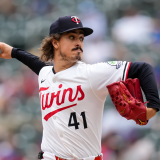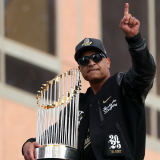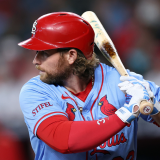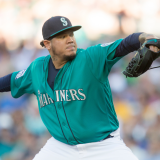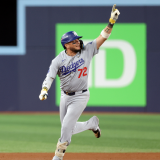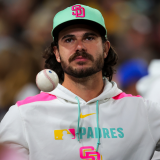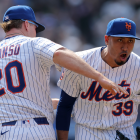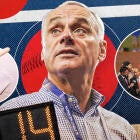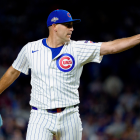2021 World Series preview: Five storylines to watch in Astros-Braves matchup
The 2021 Fall Classic kicks off Tuesday at Minute Maid Park in Houston
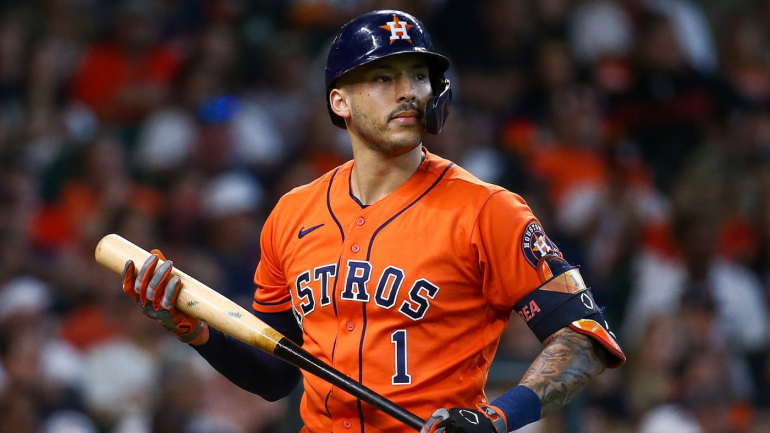
The Atlanta Braves and the Houston Astros will kick off the 2021 World Series on Tuesday night. The Astros possess home-field advantage by virtue of having a better regular season record, meaning Games 1 and 2 will be played at Minute Maid Park in Houston. (Games 3 through 5 will be hosted at Truist Park.)
The Braves, appearing in their first World Series since 1999, reached this point by first defeating the Milwaukee Brewers in four games in the National League Division Series. The Braves then outlasted the Los Angeles Dodgers, the reigning champions, in a six-game series that avenged Atlanta's loss in last year's NL Championship Series. The Braves are in pursuit of their second World Series title since moving to Atlanta.
The Astros, meanwhile, are competing in their third World Series in five years. Houston knocked off the Chicago White Sox in four games during the American League Division Series. The Astros then out-slugged the Boston Red Sox in six games in the ALCS. The Astros are seeking their second ever championship.
Clearly the recent experience, if such a thing matters at this level, favors the Astros. Here are five other storylines worth watching as the Fall Classic gets underway.
1. Can Houston's bats torch Braves' starters?
The Astros had the majors' most potent offense during the regular season, finishing first in wRC+ (a FanGraphs metric that adjusts for ballpark) and runs scored, and ninth in home runs. For our money, one of the most intriguing stories of this series is whether or not the Astros lineup can find a way to lift the pitches they see from the Braves' three main starting pitchers: Charlie Morton, Max Fried, and Ian Anderson.
When we write "lift," we mean that literally. No starting pitcher had a lower average launch angle-against during the regular season than Houston's Framber Valdez (-5.5 degrees). Morton, Fried, and Anderson weren't too shabby themselves, however. Check out their ranks among the 129 pitchers who threw at least 100 innings:
- Morton: 18th (6.8 degrees)
- Fried: 10th (4.7 degrees)
- Anderson: 8th (4.5 degrees)
There's a whole conversation to be had about the intersection and interplay of swing planes and approach angles that we're not trying to have here.
All we're observing is that the Astros will have to find a way to get the ball higher in the air if they're going to exert maximum damage against the Braves rotation -- a rotation that, at least on paper, looks to be the better of the two staffs. If the Braves trio holds true to their regular season form, that's going to be a tough assignment.
Even if the Astros can launch off against the Braves' starters, there's a flip side worth considering.
2. Can the Astros find enough pitching?
The Astros are expected to be without Lance McCullers Jr. for the remainder of the playoffs. Factor in Justin Verlander's season-long absence, and Zack Greinke's non-stretched-out state, and Houston will have to bank once again on a compromised rotation of Valdez, rookie Luis Garcia, José Urquidy, and Jake Odorizzi.
It's fair to wonder how the Astros will approach this series from a personnel standpoint, and if they'll be able to keep enough runs off the board. During the ALCS, the Astros had just three pitchers record at least 15 outs: Valdez (who was the only pitcher to record 21 or more), Garcia, and multi-inning reliever Cristian Javier.
Garcia, who tends to struggle against left-handed hitters, would appear to be the fulcrum here. Remember, the Braves top hitters are largely of the left-handed variety: Eddie Rosario, Freddie Freeman, and Joc Pederson. Ozzie Albies, a switch-hitter, will also be batting from the left side most of the time. Having Garcia start Game 2 (and possibly Game 6) might make the most sense for Houston. That way, the Astros can limit his exposure against the Braves lineup without having to worry about burning out their bullpen as part of the three games in three days midpoint of this series.
Of course, figuring out how to line up the starters might be the easiest pitching decision the Astros make this series.
3. Parting gift from Correa and/or Freeman?
Every passing World Series game draws the offseason a step closer. That represents a catch-22 for Astros and Braves fans, who have to weigh their desire to celebrate a title with their tension concerning a franchise mainstay's looming date with free agency. It's at least possible that Houston shortstop Carlos Correa or Atlanta first baseman Freddie Freeman will win the World Series as their final act with their current team.
Of the two, Correa seems far more likely to depart, as he's the favorite to land the richest contract handed out this winter. Correa went on the record in the springtime to say the Astros don't believe in those kinds of deals. It's a statement with merit: Houston let George Springer walk last offseason, so they've shown the willingness to move on from beloved homegrown players who are seeking large payouts.
Freeman, conversely, seems like a lock to remain in Atlanta. Still, you can't blame any Braves fan who remains anxious about the situation until the ink dries on a new deal.
4. Which seasoned manager will prevail?
Hiring younger managers is in vogue, but it won't result in a World Series, not this year. Rather, no matter which team wins, a longtime baseball person will get a ring.
Houston's Dusty Baker has called the shots for his teams in parts of 24 seasons. He's the only skipper to ever lead five franchises to the postseason, having amassed more than 2,000 career victories. Add in Baker's playing career, and it's accurate to write that the only thing he hasn't accomplished in baseball is win a World Series as a manager. This might be his last chance, as his contract expires at the end of the series.
Atlanta's Brian Snitker is still somewhat new to managing. He took over the Braves on an interim basis in 2016 and then did the unthinkable by winning enough games to keep the job and lead the franchise out of a rebuild. Snitker's relative inexperience as a skipper (compared to Baker, anyway) shouldn't obscure that he's been with the Atlanta organization in some capacity or another dating back more than 40 years.
One fun tidbit worth knowing: Snitker's son, Troy, is a hitting coach with the Astros.
5. Projections favor the Braves... barely
Normally, we like to note how the two teams performed against one another during the regular season. That isn't an option here, as the Braves and Astros have not met up in a game of record since the 2017 season. The Astros won all four of those encounters, outscoring the Braves by a 38-13 manner, or by more than six runs per contest.
How much predictive power do those games hold? Zilch. To illustrate the point, consider that the last time these two teams met, the Braves lineup included Brandon Phillips, Matt Kemp, and Matt Adams, with Jaime García getting a start.
For something that should have predictive power, we'll end by noting that SportsLine's simulations have the Braves as the favorite by the slimmest of margins. Atlanta wins in 50.5 percent of SportsLine's projections. Houston, it should be noted, is considered the betting favorite (-150) by Caesars Sportsbook.


